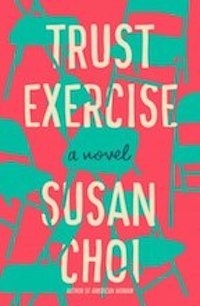It’s Pontius Pilate’s famous question, but to bring it up here now, in May 2020, might sound like a tossed-off nod, to evoke his existential weariness.
Moreover, we live in an era now, don’t we, when we do not speak of truth, but only of “truths”—varying, multiple, in wild tension with one another? And any singular truth would only be just that, whether his, hers, or theirs. It would, we aver, be “problematic” to claim otherwise.
And yet the very fact that we remember the Pontius Pilate reference so readily is a credit to its enduring relevance. It is still the question, stark and knifelike in its beauty.
I don’t know that I have seen these notions of truth—both the old ideal of the “objective” one and the more current, perspectival one—mixed in a more arresting manner in recent years than in Susan Choi’s 2019, National Book Award-winning novel, Trust Exercise.
If you’re any kind of reader at all of contemporary American fiction, you’re probably somewhat familiar with the book’s plot, which concerns the romance of high school drama students Sarah and David, and the long, long tail of its aftermath. (If not: Warning! Some spoilers ahead.) The first section of the novel, “Trust Exercise,” launches with the transcription of David’s and Sarah’s erotic encounters over the muggy summer between tenth and eleventh grade, in a sprawling Sunbelt city—not unlike Choi’s hometown of Houston.
The bulk of that first section, though, focuses on how David, and particularly Sarah, wonder what their affair means, once they’ve returned to school and find themselves unable to take up where they’ve left off. Nonetheless, they are forever twinned in the collective imagination of their arts magnet high school, CAPA, the “Citywide Academy of the Performing Arts.” This is especially the case for their acting teacher, the godlike Mr. Kingsley—“a member of the original Broadway cast of Cabaret,” and in 1982, the first gay man they had ever known. Under the mantle of “ego deconstruction” exercises, and in front of the school community that is effectively a dramatic chorus, Mr. Kingsley prods a resistant David and Sarah to expose their feelings about what happened. Finally, he betrays them both by airing publicly the confidences he has been told:
“’Is that the best you can do?… This is the girl you walked miles for. In the heat. With a stupid tennis racket so your mom would think you’d gone to the club. Because you loved her, David. Don’t lie to her now, and don’t lie to yourself.’”
—even as his pushing them toward emotional authenticity confuses them all the more about what it means. The gaps between who all these CAPA students are perceived to be, who they “truly” are, and who they will turn out to be decades later, are all arrayed.
Or maybe not: The thing that we find out decades later, in the book’s second section, also titled “Trust Exercise,” is that the whole first section is actually from an autobiographical novel written by “Sarah,” that has been read by “Karen.” “Karen” was a minor character in the first section, but, as we learn, was far more integral to the “actual” events of the book and can read behind them. “Karen” sets about teasing out the lacunae between Sarah’s narrative and her own.
“Karen”—or as she chooses to designate herself, Karen—parses out the narrative:
Is it better or worse that the code is so easy to crack? Sarah and David are the people they must obviously be, only their names are altered, and not even altered that much—their new names are in the right spirit, they’re true to their objects, in fact they’re so apt they’re unnecessary, their divergence from the truth is so inconsequential that they might as well be the same truth they’ve replaced. Mr. Kingsley, too, is the person Mr. Kingsley must obviously be, his new name, too, is in the right spirit. If certain colorful revisions of his character have been undertaken, they don’t serve to disguise the historical person, though they do disguise something.”
Throughout this second “Trust Exercise,” Karen sets about devising another opportunity for public exposure of the principal characters, one that will reveal the “real” parameters of who David, Sarah, Mr. Kingsley, and Karen “are,” and that yields an unexpected and shocking denouement. But this narrative, too, in its own way turns out to be problematic—as is explored, murkily, in the novel’s third section, a third “Trust Exercise.”
Now, you would think that that a novel so based on metafictional devices—the three “Trust Exercises,” get it?—would embrace the perspectivalism of its very construction. But that’s not what happens. There’s no resignation here, but an ongoing, dogged pursuit: all of these essais of the will and imagination keep bumping up against something that is actual, physical, and real.
The final “Trust Exercise” contains, in fact, its own physical revelation about the events of the book, one that subsumes and surpasses the partial narratives that have been previously offered. It is a breathtaking ending that is its own final word. (Or Word?)
In that sense, there is a Truth—capital T—behind all the conjecture.
But the connections and pathways to it remain obscure, and thus approachable only through humility, and Mystery. There’s a there there, but we are never going to be able to tease it all out.
I wonder if Choi realizes, in this midsrashic construction, that for all its destabilizing uncertainty, hers is an essentially religious novel.
Caroline Langston was a regular contributor to Image’s Good Letters blog, and is writing a memoir about the U.S. cultural divide. She has contributed to Sojourners’ God’s Politics blog, and aired several commentaries on NPR’s All Things Considered, in addition to writing book reviews for Image, Books and Culture, and other outlets. She is a native of Yazoo City, Mississippi, and a convert to the Eastern Orthodox Church. She lives outside Washington, D.C., with her husband and two children.





